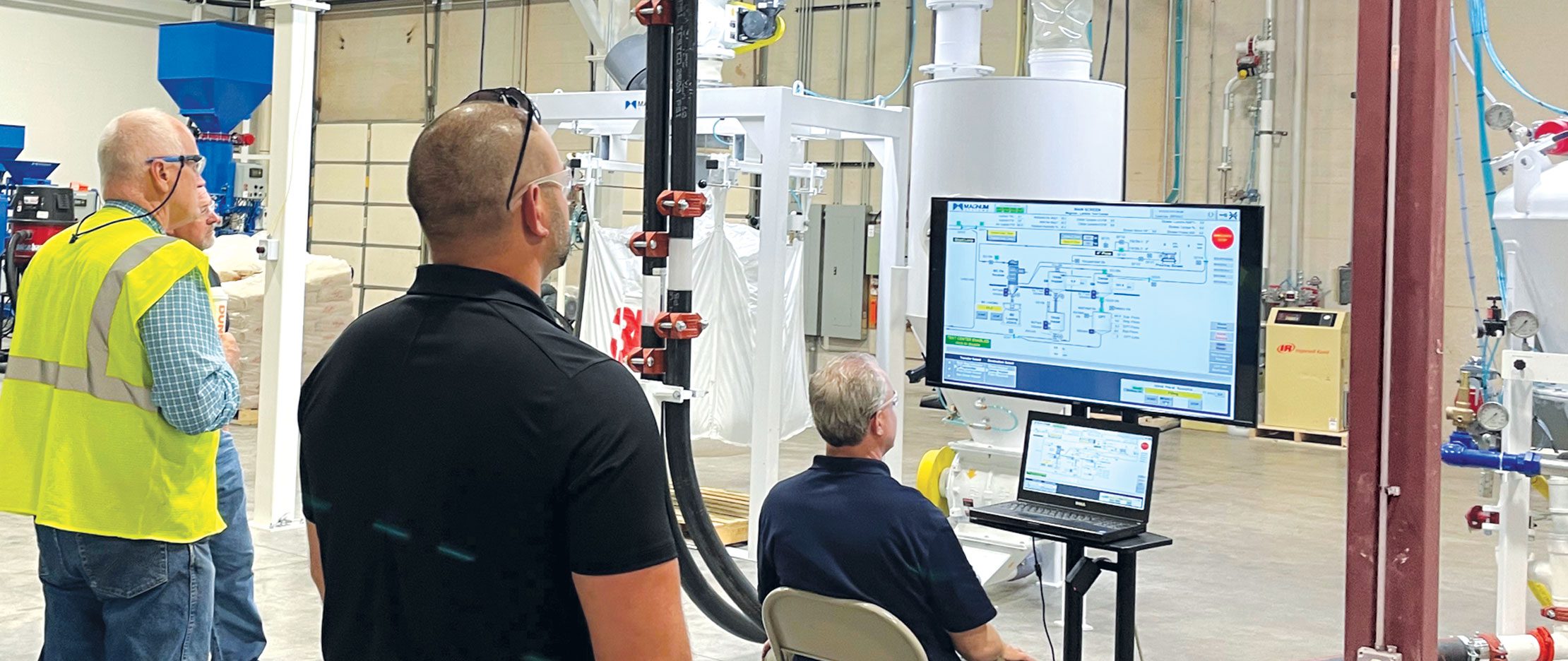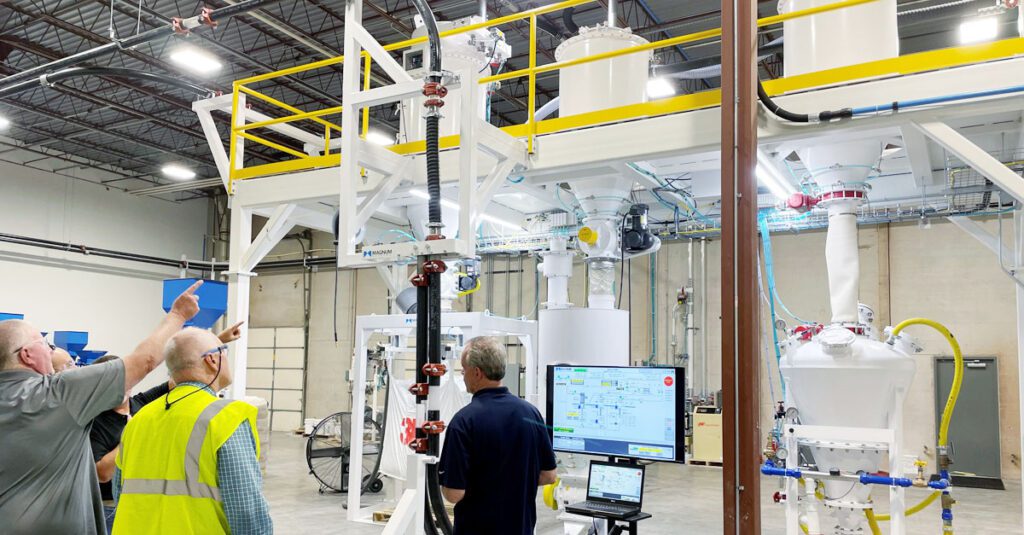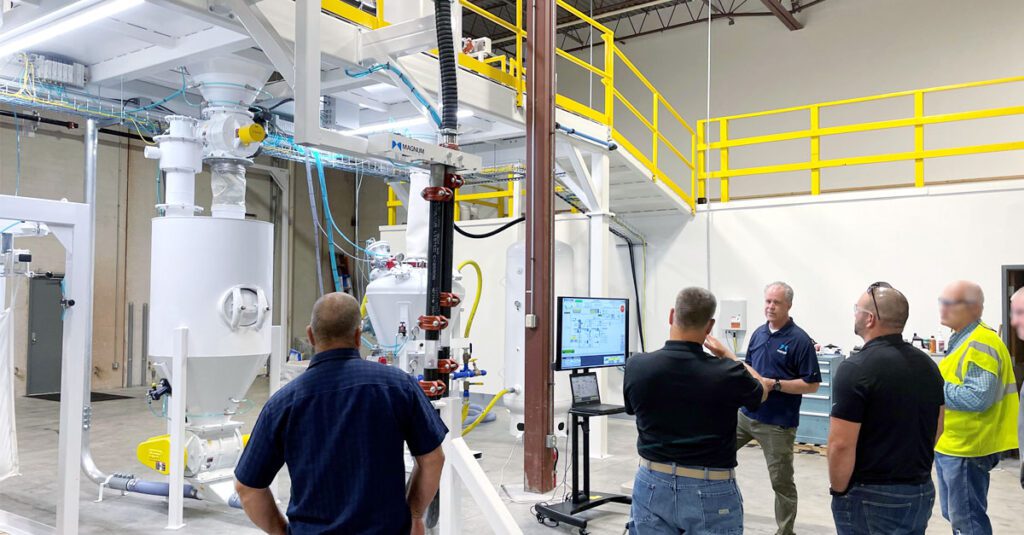
To remain competitive, industrial manufacturers understand the importance of efficiency, reliability, and precision in their processes in bulk material handling. The performance of bulk solids—whether powders, granules, or pellets—directly impacts productivity, product quality, and operational efficiency.
Many manufacturers of bulk solid handling equipment rely on custom material testing to optimize the performance of handling, conveying, and packaging solutions, which are tailored to the unique properties of their materials. In order to address this need, Magnum Systems' test lab in Lenexa, KS, serves various industries, including chemicals, food, life sciences, and agriculture. Custom material testing ensures the best performance of bulk material handling and processing systems. The Magnum Systems test lab allows manufacturers to test and refine their systems according to specific needs. As a result, they can ensure their solutions are well-tailored to meet industry standards and performance expectations.
Why Custom Material Testing Matters
Every bulk solid behaves differently. This variation depends on its composition, origin, and the environment in which it is processed. As a result, standard solutions often fall short. They can lead to inefficiencies, downtime, and costly retooling. A testing partner can help mitigate these risks. They provide data-driven insights for system design and operation.
Magnum’s testing facilities consolidate pneumatic conveying and packaging testing in one location. This approach streamlines the process for clients and ensures a comprehensive evaluation under real-world conditions. First, our lab assesses various material properties, including flow characteristics, bulk density, particle size, adhesiveness, cohesiveness, and degradability. This capability is especially useful for manufacturers in the chemical, food, and agricultural sectors, where material properties can vary significantly.
Let’s take a look at the top five benefits of custom material testing:
1. Optimized Equipment Design and Selection
Using a test facility allows you to evaluate the behavior of bulk solids under varying conditions, such as flow rates, moisture, and particle size. By testing physical characteristics, the test lab can identify how well a material handles, whether in conveying or packaging, or determine what additional equipment is needed to ensure efficient flow from vessels.
This data ensures that the equipment used for conveying, filling, or packaging is ideally suited to the specific materials being handled. By partnering with a quality test lab, such as Magnum Systems’ test lab in Lenexa, KS, manufacturers can leverage expert insights to select or design equipment tailored to their particular requirements, minimizing waste and maximizing operational efficiency.
2. Improved Performance and Process Efficiency
Inefficient material handling can result in costly production delays and increased operational expenses. Custom material testing allows manufacturers to identify potential bottlenecks and challenges before they occur.
Equipped to simulate real-world conditions, Magnum’s test lab helps companies fine-tune their processes for smoother, faster, and more efficient production cycles in key industries like agriculture, food, and chemicals.
“A recent test compared the friability and average particle size reduction of two similar materials after pneumatic conveying at a specified rate,” Ben explains. “The first material tested experienced significant breakage, which was found to be intolerable for the facility's downstream processing.
“The second material, conveyed at an equal mass feed rate and with convey parameters, resulted in a nearly 80% reduction in breakage,” Ben adds. “The test lab was able to identify potential issues and benefits of changing materials without the actual production facility needing to stop operations for testing.”

3. Reliable Results For Enhanced Product Quality
Maintaining product integrity and consistency is crucial for industries like food and chemicals. Our testing facilities evaluate how materials respond to pneumatic conveying and packaging, helping you maintain a consistent quality product and meet your industry’s stringent standards.
“Poorly calibrated systems can negatively affect product consistency and quality,” says Ben Adwell, Magnum’s Test Lab Manager. “Custom material testing ensures precision in material flow, mixing, and packaging, resulting in a higher-quality end product.”
4. Reduced Downtime and Maintenance Costs
Manufacturers can proactively prevent equipment wear, blockages, or breakdowns by identifying and addressing potential equipment issues using a material testing partner. Fortunately, Magnum’s test lab helps uncover hidden vulnerabilities that could lead to costly downtime and maintenance. This preventative approach helps save time, money, and resources while ensuring the system operates at peak performance.
“One test we perform is a permeability and fluidization of the material,” says Ben Adwell. “These test results can be used to more closely identify which type of conveying would best suit or what kind of packaging equipment would work best with your material."
This permeability and fluidization test can help identify potential issues, like material stratification, which may lead to inconsistent material feed and quality issues. Therefore, spotting this challenge early will help you choose the right equipment, saving thousands of dollars.

5. Tailored Solutions Across Diverse Industries
Every material behaves uniquely, and each industry has its own requirements. Consequently, material testing allows Magnum to create tailored solutions for different materials, such as fine powders in the chemical industry and grains in agriculture. By considering these characteristics and real-world application needs, our testing lab offers specific solutions that help future-proof your facility's success.
Why Choose Magnum Systems?
Magnum’s test lab offers the facilities and expertise to support manufacturers seeking reliable and efficient material handling solutions. With capabilities to simulate various operational conditions and test equipment functionality, the lab helps eliminate guesswork in system design and showcases our commitment to excellence, resulting in our customers’ success.
“Testing a material in a customer’s facility can be extensive, requiring equipment downtime, logistics planning, and countless hours of background work that take up valuable personnel and resources,” Ben says. “Having an outside group perform preliminary testing can have a large potential for savings for your company.”
Take the next step—contact us today and discover how our testing facilities can transform your manufacturing processes.
Magnum Systems podcast series, AIM!
RELATED POSTS
Custom Material Handling: The Role of Application Engineers
Understanding Material Characteristics in Bulk Material Handling Design
Five Ways To Limit Product Breakage With Your Pneumatic Conveying System
Understanding Pneumatic Conveying Systems with Magnum Systems’ Dave Wollenberg
Related Post
How Unified Namespace Solves Manufacturing’s Data Silo Problem
The Rise of Smart Plants: How System Integration Engineers Are Driving Industry 4.0
System Integration in 2026: Navigating New Manufacturing Regulations